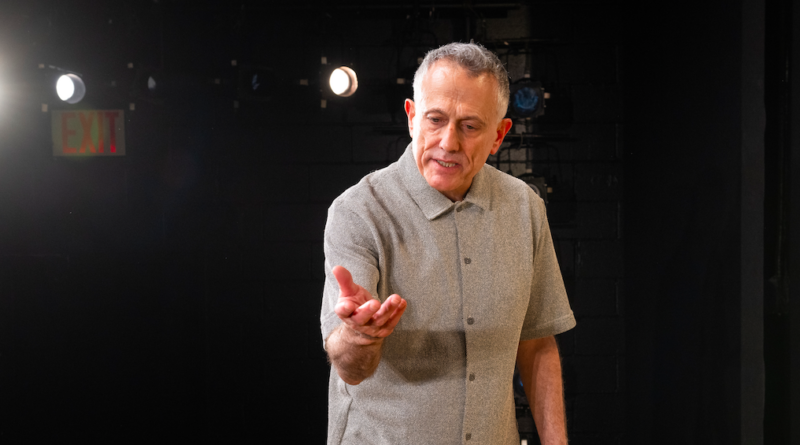INTERVIEW: Getting to know David Greenspan
Photo: David Greenspan performs in I’m Assuming You Know David Greenspan at the Atlantic Theater Company. Photo courtesy of Ahron R. Foster / Provided by BBB with permission.
NEW YORK — David Greenspan has achieved a certain acclaim and notoriety in his career that can best be defined by the word “legend.” He has performed in his own works and the plays of others for decades, bringing poignant and powerful characters to life in a variety of settings and across the New York theater landscape. His most recent role is a most unique one, and he’s loving every minute of it.
Greenspan is currently starring in the solo work I’m Assuming You Know David Greenspan, written by Mona Pirnot and directed by Ken Rus Schmoll. Performances of the Atlantic Theater Company work continue though April 30 at Atlantic Stage 2.
In the play, Greenspan portrays Pirnot and three of her friends. They have assembled together to talk about working in the theater, including the financial difficulties of becoming a playwright. But Pirnot has an idea for a new show that she hopes will be creatively sustaining: She wants to write a play about writing a play for Greenspan, even without his prior knowledge of the project. Her only worry is whether or not he’ll say yes to the 80-minute solo piece. Spoiler alert: He accepts the offer.
“Our director, Ken Rus Schmoll, with whom I’ve worked before, called me and said he had a play that someone had sent, and he read it and liked it,” Greenspan said in a recent phone interview. “He mentioned that the writer was obsessed with me, so I got a little nervous when I heard that. She had written this play. He gave me the title. I was a little, ‘Wow.'”
Greenspan decided to give the play a read, but first he handed the script over to his partner, who ultimately thought the piece was very funny but that the actor should decline the offer. Why? It would be strange to talk about oneself on stage.
“Mona seemed very nice in the emails,” he said. “I thought, I should at least read the play for her out loud, so she and Ken and I met. And we read the play, and they were very enthusiastic. I still didn’t know what to think about it all. … By that point, early on, the theater was already ready to say yes, so we just kind of proceeded. Indeed, that’s how it happened. I think the play has turned out very well. I’ve grown to love it, and I love performing it and working with Mona and Ken.”
Talking about oneself on stage has ultimately proved a welcome challenge for Greenspan. He fully embodies the four characters, one of whom is Pirnot herself, so he doesn’t see himself as Greenspan anymore on the Atlantic Stage 2.
“Once I became invested in the characters, it’s not my opinion; it’s simply the character I’m playing,” he said. “I try to play her character authentically, and so I don’t really think about it anymore what one person thinks of me. It’s more playing her enthusiasm. It has a resonance with me, but I’m more focused on the character who is saying it.”
What Pirnot details in the piece, especially the realities facing the vast majority of playwrights, struck a chord with Greenspan. Making it in the arts is difficult, if not impossible, and theater chews up and spits out many a writer and many an actor. Pirnot is speaking a truth that Greenspan knows uniquely and perhaps better than most.
“I think it’s true for everybody in the theater because we’ve found that actors, directors, other playwrights, even designers, other people involved in the theater, when they see the show, they laugh, but they feel pain to enter into the precarious reality of working in the theater,” Greenspan said. “I would go so far as to say it’s true of anybody in art, performing arts certainly. It is precarious, and one is not guaranteed an income. One is not on a regular salary, so there’s a built-in insecurity and certainly built-in lack of job security that other professions handle more readily.”
Greenspan, who has acted in his own plays like Dead Mother, She Stoops to Comedy and Go Back to Where You Are, recognizes the sacrifice that is needed to make a living in theater, and he fully understands why so many people decide to choose different professional avenues. In some ways, there is lost art there because many talented people decide the uncertain life is not a life for them.
“I think it’s always been the case that people have to make decisions at certain points if they’re willing to sacrifice A, B or C,” he said. “In fact, I just ran into a neighbor in my building. I live in an artist building, and her son I know as well. He’s a very fine stage actor. I was talking to her, and I asked how he’s doing. She said, ‘He’s fine. He’s not working right now. He can’t do theater because he has two children, one of whom is about to enter college.’ … People start to have a desire to start a family, get a house. Then there are other challenges to be met. Certainly now, it might have been different at other times, there are certain challenges making a living, particularly since a lot of the theater, certainly new plays, are produced off-Broadway. It was different many, many years ago.”
In the play, Greenspan plays Pirnot who reads from a news article about Greenspan — very meta-theater this is. In the article, the actor opens up about the joy of finally being accepted to live in an artists’ residence in the West Village, the same residence where he now lives.
“The rent makes it possible,” Greenspan said. “My partner and I lived in Jersey City for 15 years in a railroad flat, so it was very inexpensive when we got there. It remained pretty inexpensive. It meant getting on the PATH train every time we wanted to get into town and out of town, so this is the only reason we didn’t live in New York, let alone in the West Village where the complex is located. So it does make that possible. In fact, this weekend there were some neighbors of mine — one is a painter, other people are performers — who came to see the show. In fact, I’m trying to arrange some tickets for somebody down the hall. The man is a poet, and his partner, she’s a visual artist. I’m trying to get them inexpensive seats, but there is very much a sense of community in this building. It’s one of the things I feel most grateful for. In many respects, people get involved with each other’s lives and see each other’s work in ways they wouldn’t in a normal apartment building because this building has an art gallery, so the visual artists exhibit, and people can gather to see the shows, things like that.”
When watching I’m Assuming You Know David Greenspan, which has been met with critical acclaim and sold-out performances, one is able to appreciate Greenspan’s full-on physical performance of a marathon monologue that finds the actor turning left and right as he brings these four characters to life. This type of physical performance is his bread and butter.
“When you’re in a play, and you’re playing a featured role, the physical choreography, the blocking, is like a muscle memory, and it’s attaching itself to what you’re saying,” he said. “There’s even muscle memory in the mouth, I think. The words come out because the mouth remembers where to go after rehearsing it a certain amount of times, so indeed the kinetic component of the performance does play into the memory of the words. Also, in fact, if something unexpected happens on stage, you have to be relaxed enough to know how to deal with it without losing your place. Like if somebody walks out of the theater in the middle of the show, you have to be able to ride with that without losing your balance.”
At one point in the play, the character of Pirnot ponders what would happen if she wrote this play about Greenspan and he declines to take the offer. It was a risk she was willing to take, and it paid off.
“As a general rule, I will always accept an offer,” Greenspan said about his work commitments today. “The only time I won’t do that is if I have a prior commitment that I can’t resolve in terms of doing both projects, but as long as I’ve made a commitment to a project, I stay with it. And then I’ll have to decline any other offer that I can’t. Unless it’s just a matter of life and death or finances, I stick with a project I first commit to, but then I’ll be open to anything else that I can do that doesn’t conflict with commitments I already have, even if it’s something in development that I just don’t have the time for and it’s not that compelling a project. But like I say, even projects that wouldn’t strike me as the most compelling, I’ll take if I’m free. And you never know, something you didn’t think was that compelling to begin with becomes very compelling as you go along. I say to people: I’m open for business, 24 hours a day, seven days a week.”
By John Soltes / Publisher / John@HollywoodSoapbox.com
I’m Assuming You Know David Greenspan, starring David Greenspan, continues through April 30 at Atlantic Stage 2. Click here for more information and tickets.


